Designing a Leveled Conversational Teachable Agent for English Language Learners
Abstract
1. Introduction
- We developed a teachable agent that allows learners to interact with an AI conversational partner instead of performing repetitive learning alone.
- The agent was developed to reflect students’ varying levels of proficiency in English. The proficiency levels of dialogue data were calculated through the ARI index, and the dialogue dataset level was built by dividing it into 1–4 levels.
- The proposed teachable agent generates and communicates level-specific sentences to enable leveled dialogue through pronunciation and sentence-level evaluation of utterance data acquired from individual learners.
2. Designing a Leveled Interactive Teachable Agent
2.1. Leveled Interactive Teachable Agent: Concept and Modeling
2.2. Collecting and Processing Conversation Dataset for Leveled Dialogue Generation Systems
- Type 1: Question mark 1, question mark 2, normal sentence;
- Type 2: Question (Q): question mark 1 answer (A): question mark 2;
- Type 3: Question (Q): question mark 2 answer (A): general sentence.
2.3. Evaluating the Learner’s Sentence Level
2.4. Leveled Agent Dialogue Generation
3. Implementation Results
3.1. Example of Implementation Results
3.2. Evaluation of Teachable Agent Levels
- Level 1—Conversation Assessment Questions(see Table 3).
- Level 2—Conversation Assessment Questions(see Table 4).
- Level 3—Conversation Assessment Questions(see Table 5).
- Level 4—Conversation Assessment Questions(see Table 6).
- Level 2—Conversation Assessment Questions.
- Level 3—Conversation Assessment Questions.
- Level 4—Conversation Assessment Questions.
3.3. Evaluation Results
3.4. Discussion
4. Conclusions
Author Contributions
Funding
Institutional Review Board Statement
Informed Consent Statement
Data Availability Statement
Conflicts of Interest
References
- Shin, D.-H.; Kim, S.-K.; Yang, K.-M. A Study on the Effect of Conversational Agent-based English Learning System on Speaking Proficiency. J. Korea Soc. Comput. Inf. 2018, 23, 39–47. [Google Scholar]
- Kim, S.-J.; Lee, S.-J.; Yang, K.-M. A Study on the Effect of English Learning Conversation System Using Speech Recognition Technology. Int. J. Adv. Sci. Technol. 2019, 28, 813–821. [Google Scholar]
- Liu, Q.; Matsui, T.; Kaneko, K. Integrating Dialogic Feedback into an Intelligent Tutoring System for English Speaking Practice. Int. J. Distance Educ. Technol. 2020, 28, 1–17. [Google Scholar]
- Sung, M.C. Artificial intelligence chatbot developed by elementary school English pre-service teachers. Lang. Study 2020, 56, 97–115. [Google Scholar]
- Hwang, Y.; Lee, H. Artificial Intelligence and its potential in English education: Deployment and creation of an AI chatbot by pre-service EFL teachers. Multimed. Assist. Lang. Learn. 2020, 24, 104–133. [Google Scholar]
- Seong, S.; Lee, S. Analyzing learners’ and teachers’ perceptions of AI PengTalk for English learning and the suggestions for its use. J. Learn. Centered Curric. Instr. 2021, 21, 915–935. [Google Scholar] [CrossRef]
- Lee, H.J. A Systematic Review of Artificial Intelligence Use in English Learning: Focus on Higher Education. J. Humanit. Soc. Sci. 2020, 11, 2027–2042. [Google Scholar] [CrossRef]
- Kim, H.Y.; Shin, D.K.; Yang, H.J.; Jang, H.L. A study of AI chatbot as an assistant tool for school English curriculum. Korean Assoc. Learn. Centered Curric. Instr. 2019, 19, 89–110. [Google Scholar] [CrossRef]
- Okita, S.Y.; Schwartz, D.L. Learning by Teaching Human Pupils and Teachable Agents: The Importance of Recursive Feedback. J. Learn. Sci. 2013, 22, 375–412. [Google Scholar] [CrossRef]
- Biswas, G.; Segedy, J.R.; Bunchongchit, K. From Design to Implementation to Practice a Learning by Teaching System: Betty’s Brain. Int. J. Artif. Intell. Educ. 2015, 26, 350–364. [Google Scholar] [CrossRef]
- Biswas, G.; Leelawong, K.; Schwartz, D.; Vye, N.; The Teachable Agents Group at Vanderbilt. Learning by teaching: A new agent paradigm for educational software. Appl. Artif. Intell. Int. J. 2005, 19, 363–392. [Google Scholar] [CrossRef]
- Leelawong, K.; Biswas, G. Designing Learning by Teaching Agents: The Betty’s Brain System. Int. J. Artif. Intell. Educ. 2008, 18, 181–208. [Google Scholar]
- Jin, S. The Effects of Self-directed Learning through an AI Speaking Application in an EFL Speaking Class on Learners’ Self-directed Learning Ability and Speaking Skills. Stud. Engl. Educ. 2022, 27, 381–414. [Google Scholar] [CrossRef]
- Krashen, S.D. Explorations in Language Acquisition and Use; Heinemann: Portsmouth, UK, 2022; pp. 10–109. [Google Scholar]
- Lee, I. English Speaking Practice System for Non-Native Speakers Based on Reading Comprehension Checks. Master’s Thesis, Korea University, Seoul, Republic of Korea, 2022. [Google Scholar]
- Matarneh, R.; Maksymova, S.; Lyashenko, V.; Belova, N. Speech recognition systems: A Comparative Review. J. Comput. Eng. 2017, 19, 71–79. [Google Scholar]
- Muda, L.; Begam, M.; Elamvazuthi, I. Voice recognition algorithms using mel frequency cepstral coefficient (MFCC) and dynamic time warping (DTW) techniques. arXiv 2020, arXiv:1003.4083. [Google Scholar]
- Cooley, J.W.; Lewis, P.A.; Welch, P.D. The fast Fourier transform and its applications. IEEE Trans. Educ. 1969, 12, 27–34. [Google Scholar] [CrossRef]
- Smith, E.A.; Senter, R.J. Automated Readability Index: Aerospace Medical Research Laboratories; University of Cincinnati: Cincinnati, OH, USA, 1967. [Google Scholar]
- Puri, R.; Spring, R.; Patwary, M.; Shoeybi, M.; Catanzaro, B. Training question answering models from synthetic data. arXiv 2020, arXiv:2002.09599. [Google Scholar]

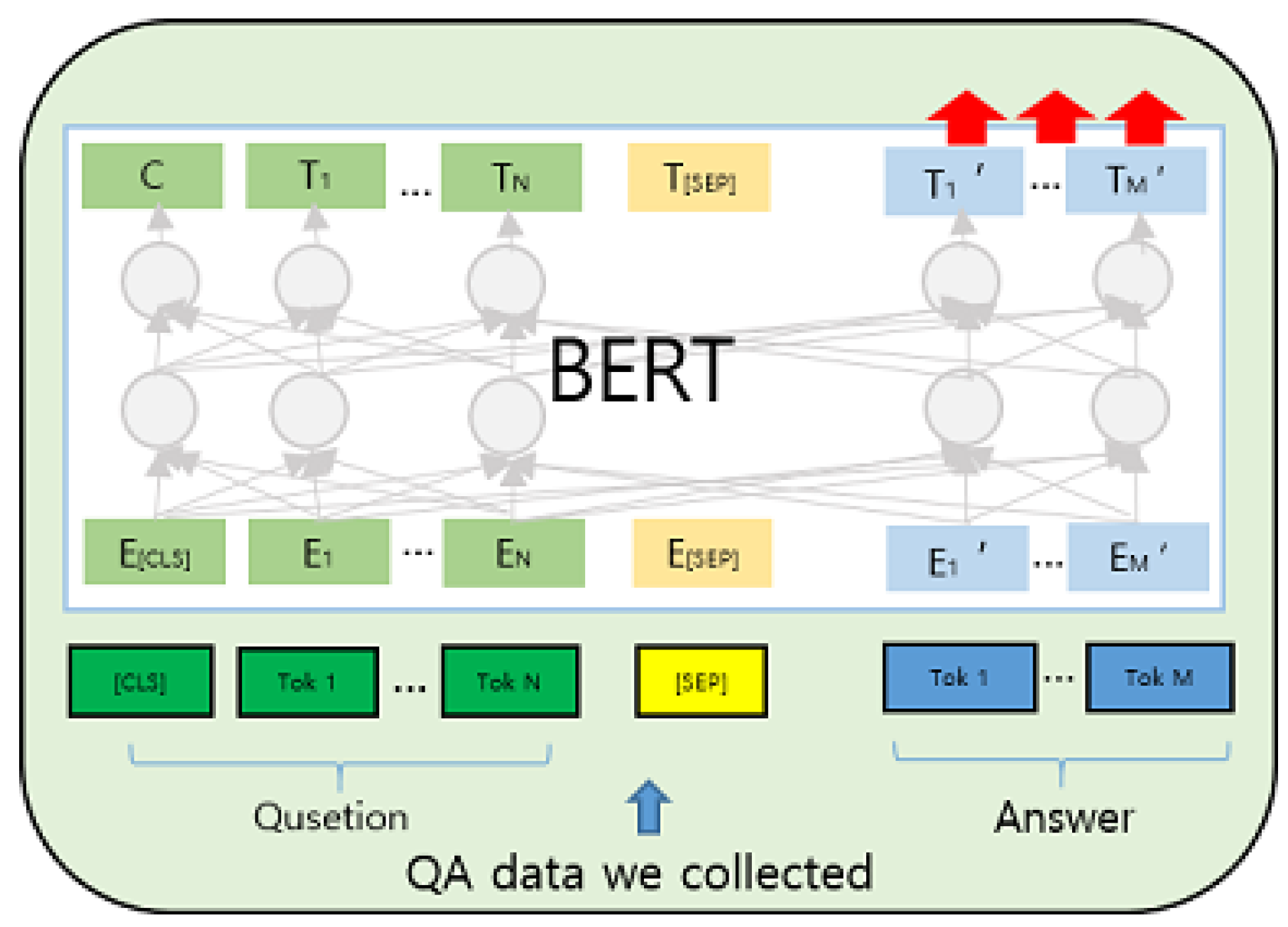


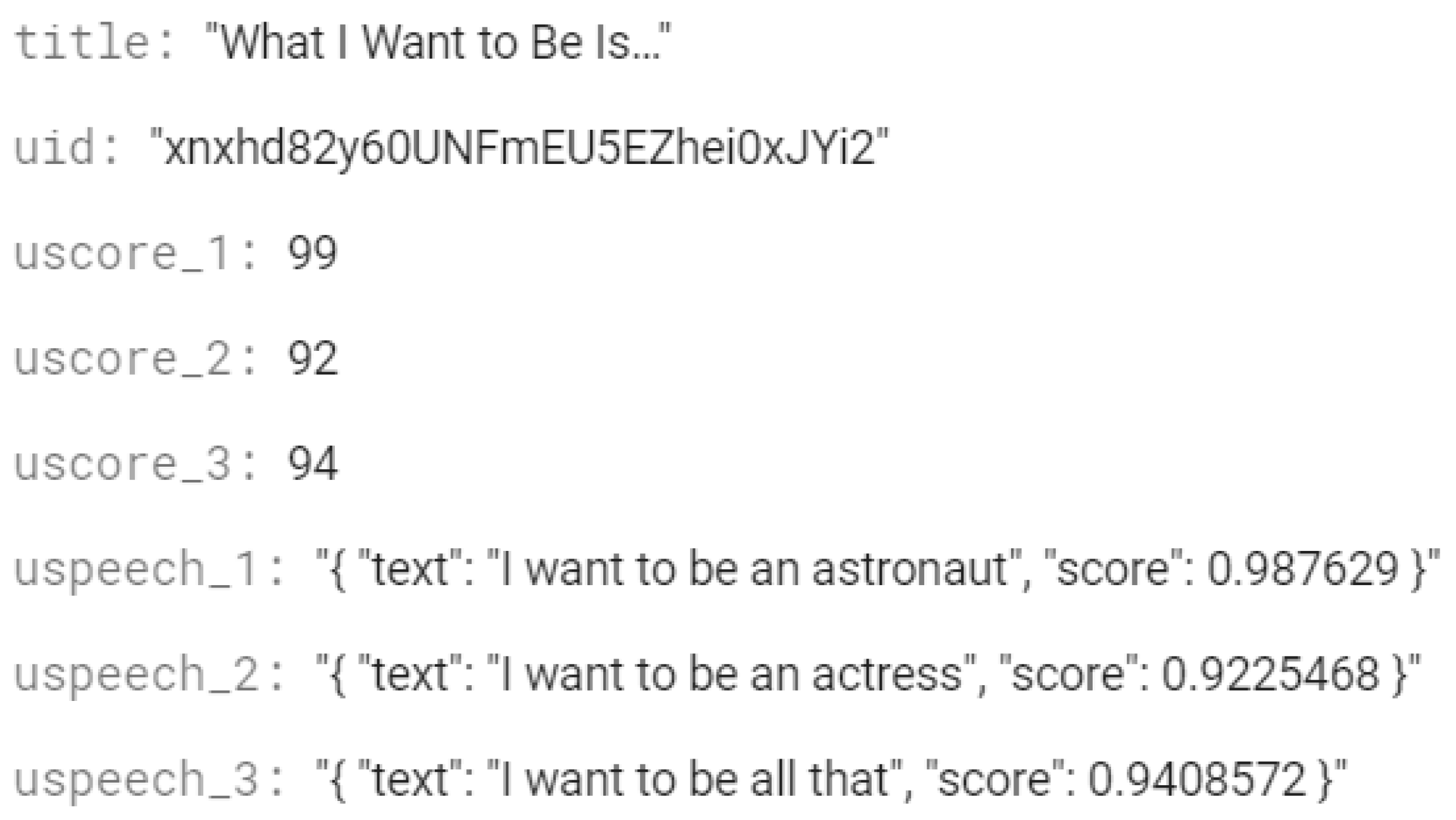
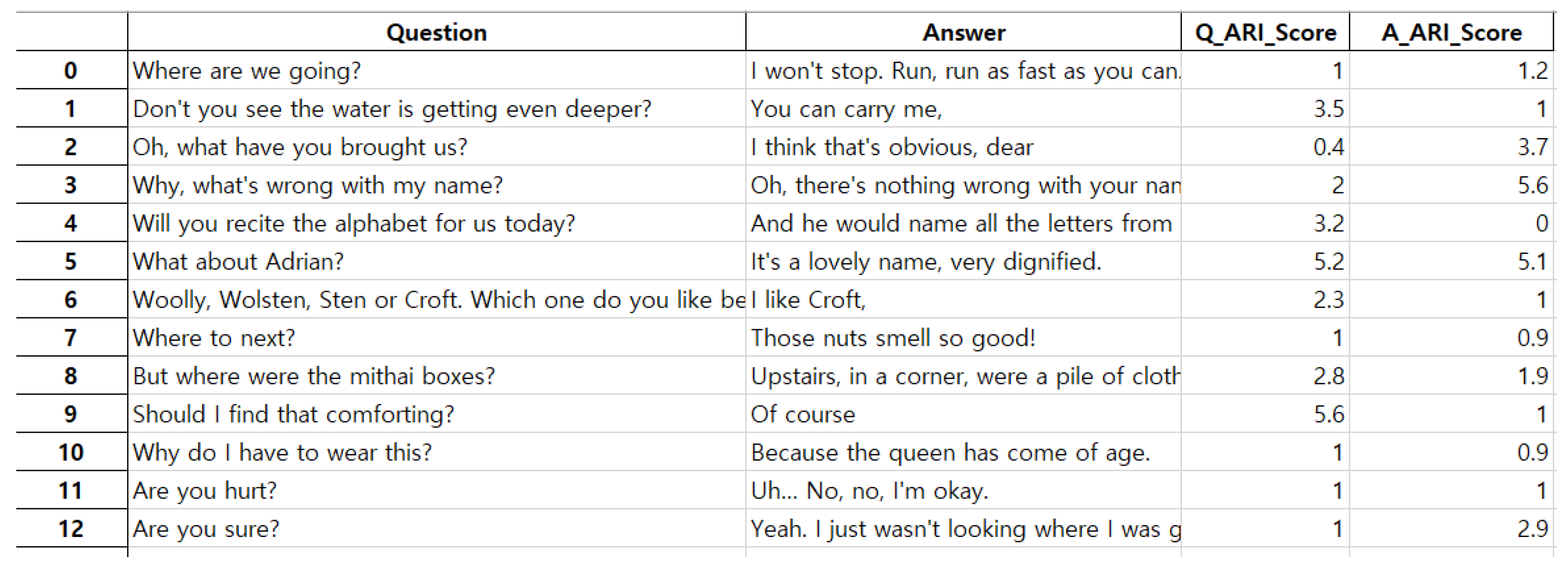
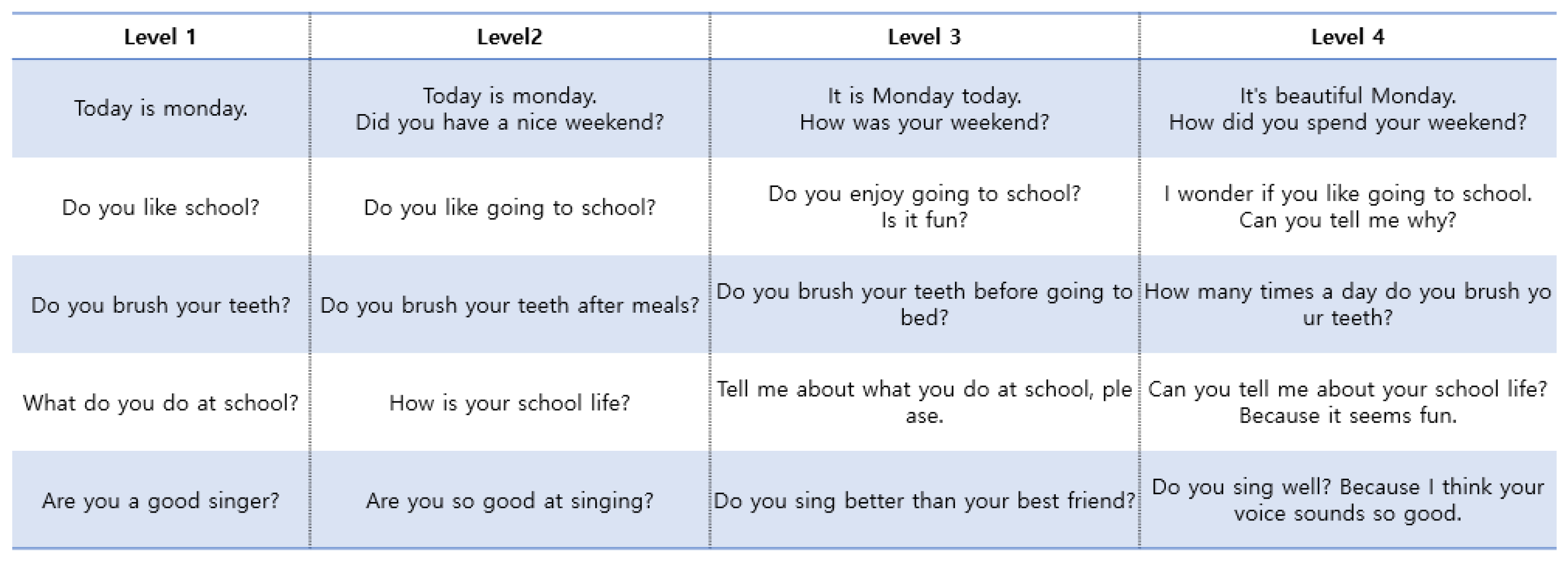
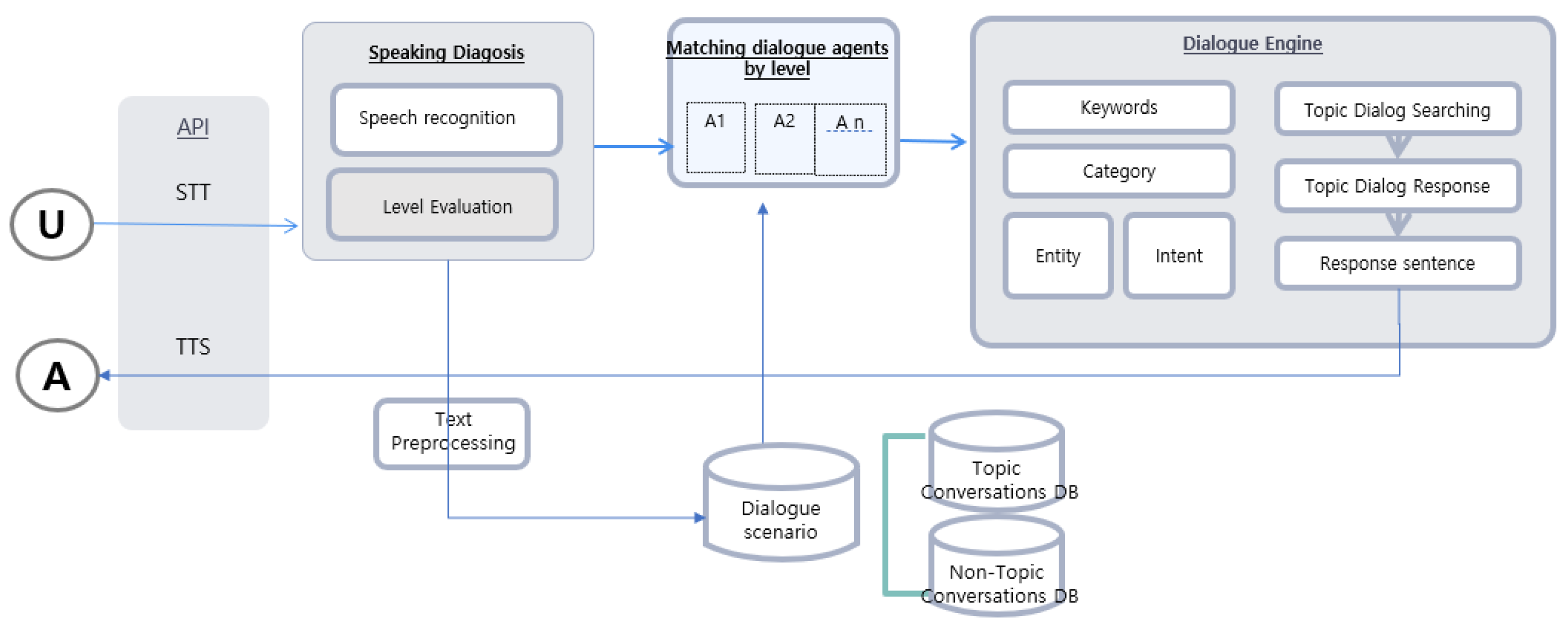
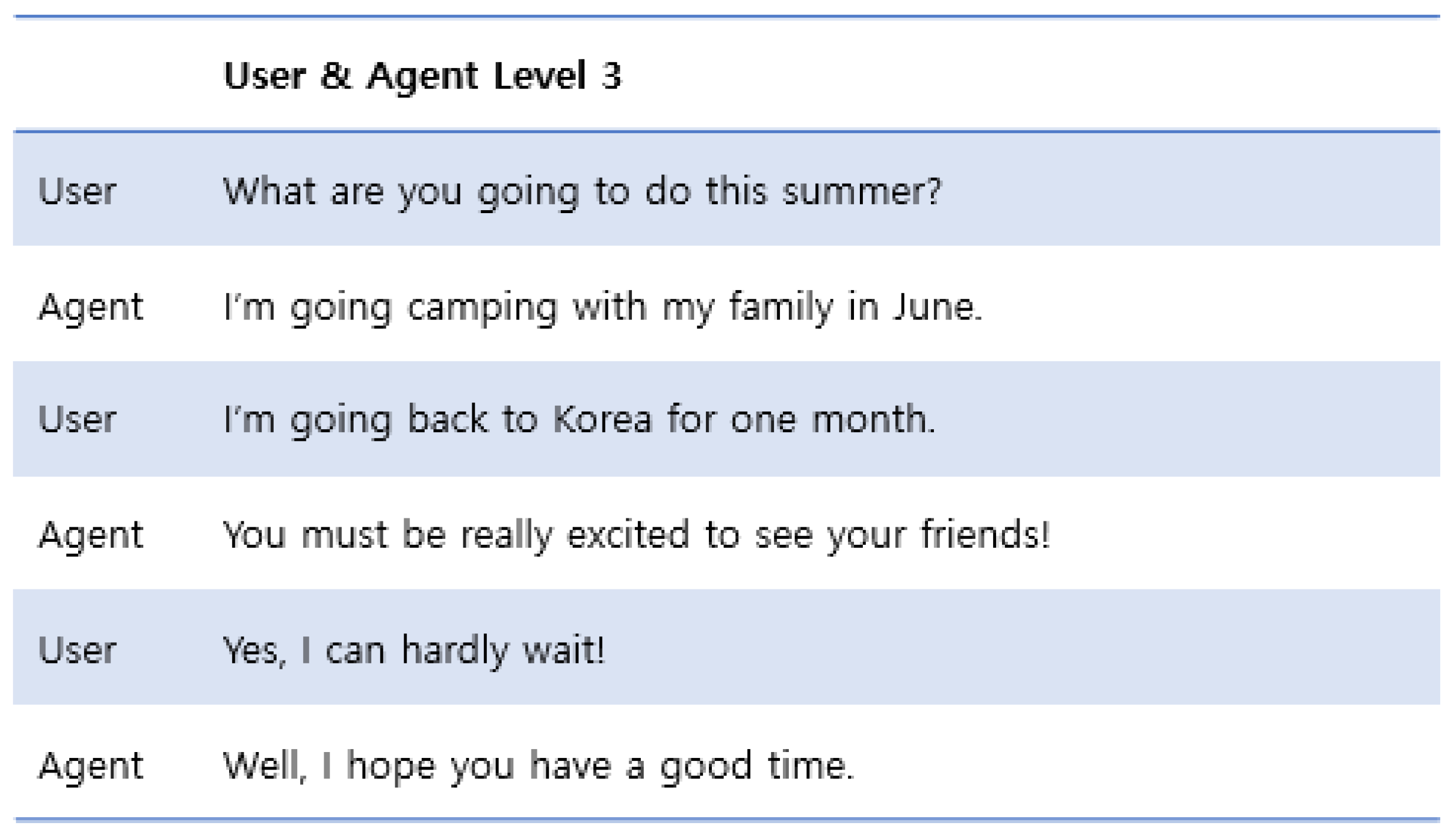
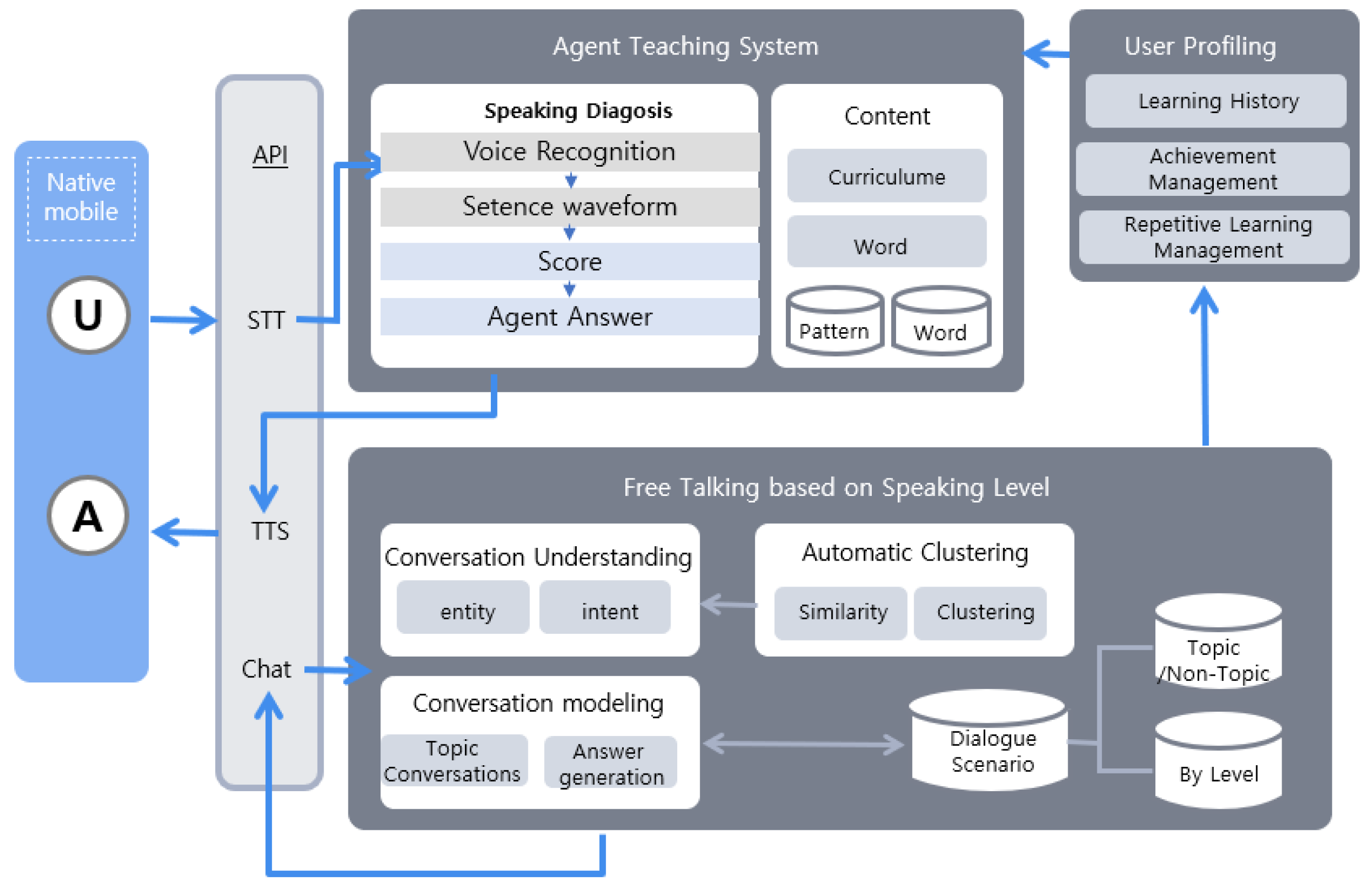
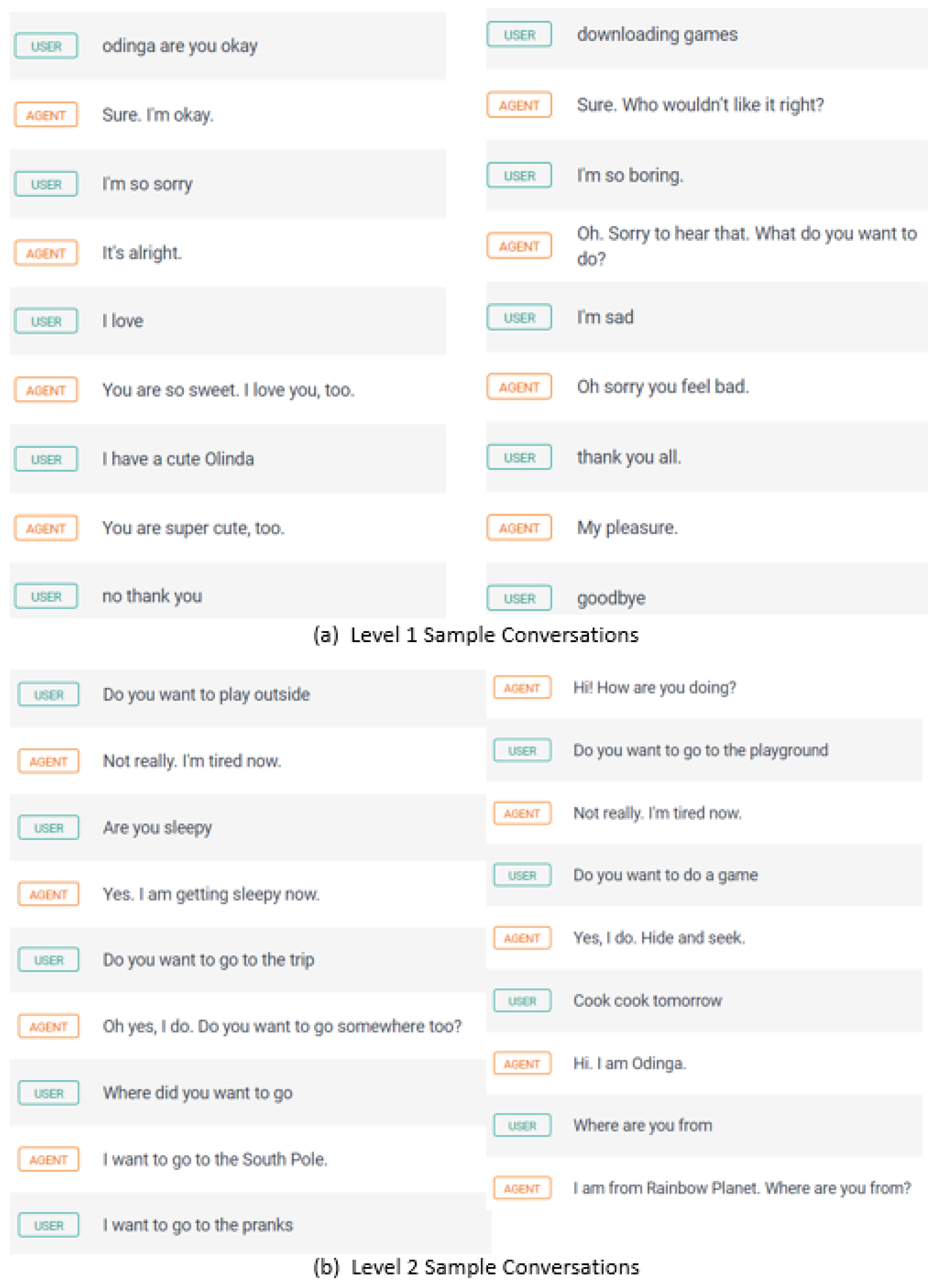
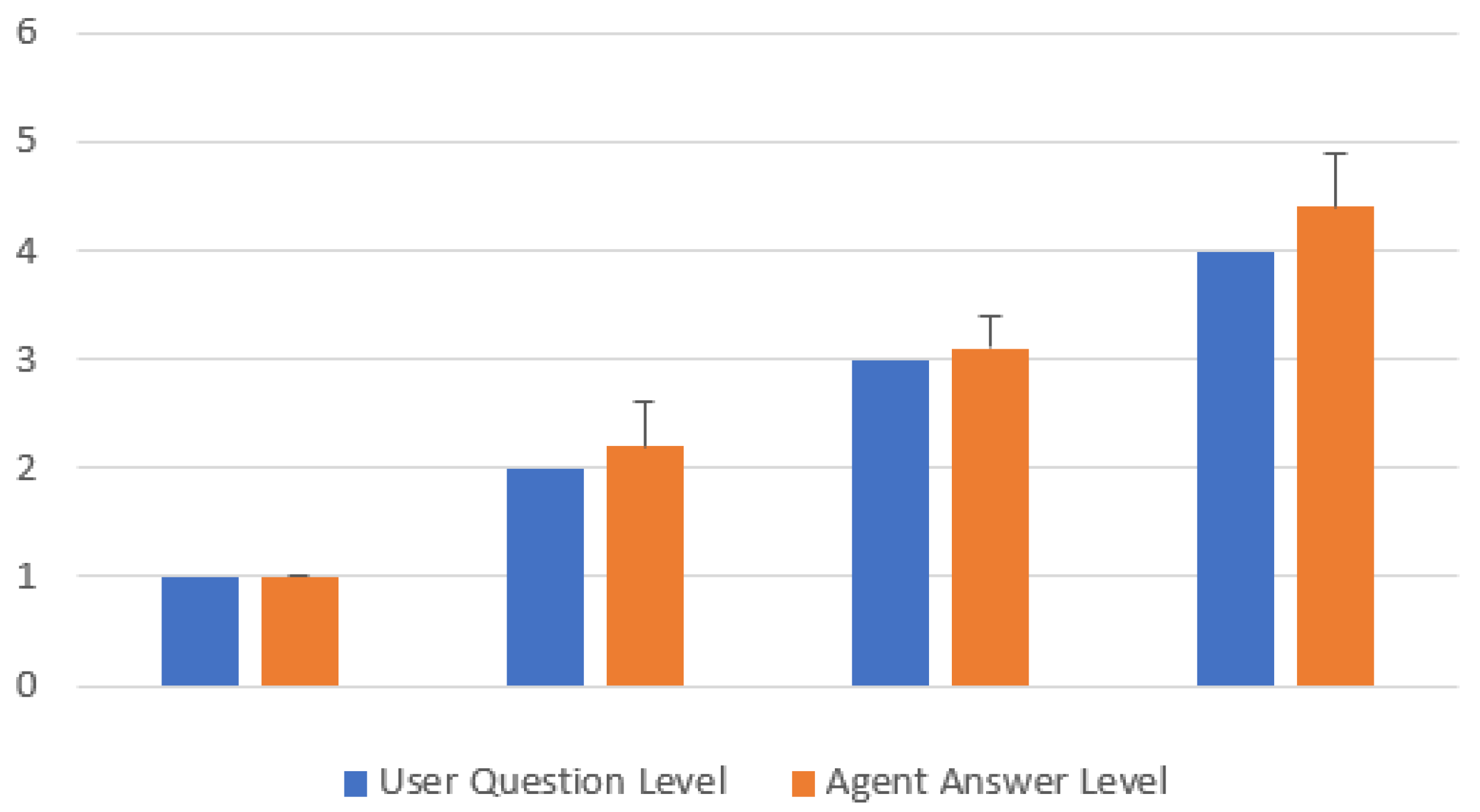
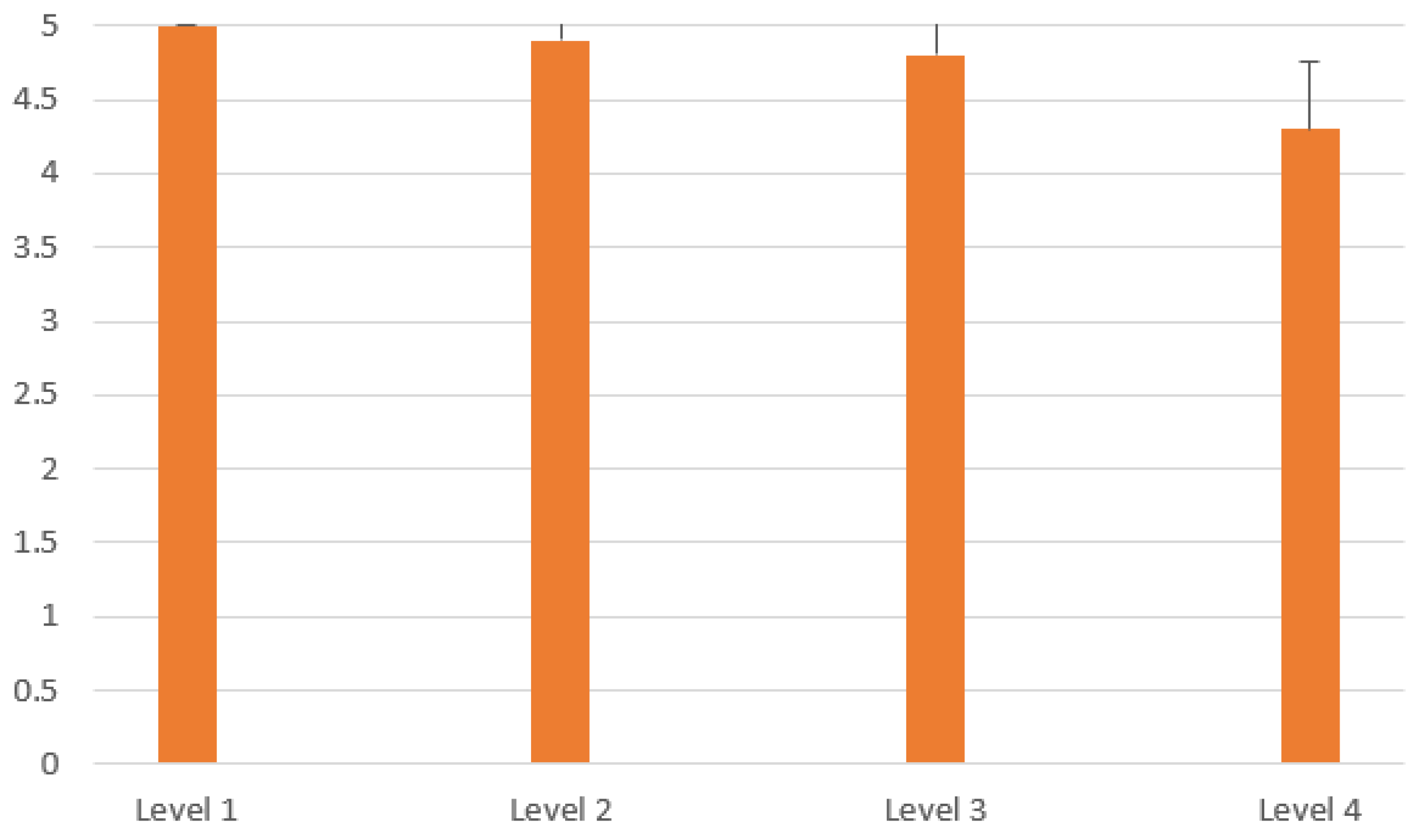
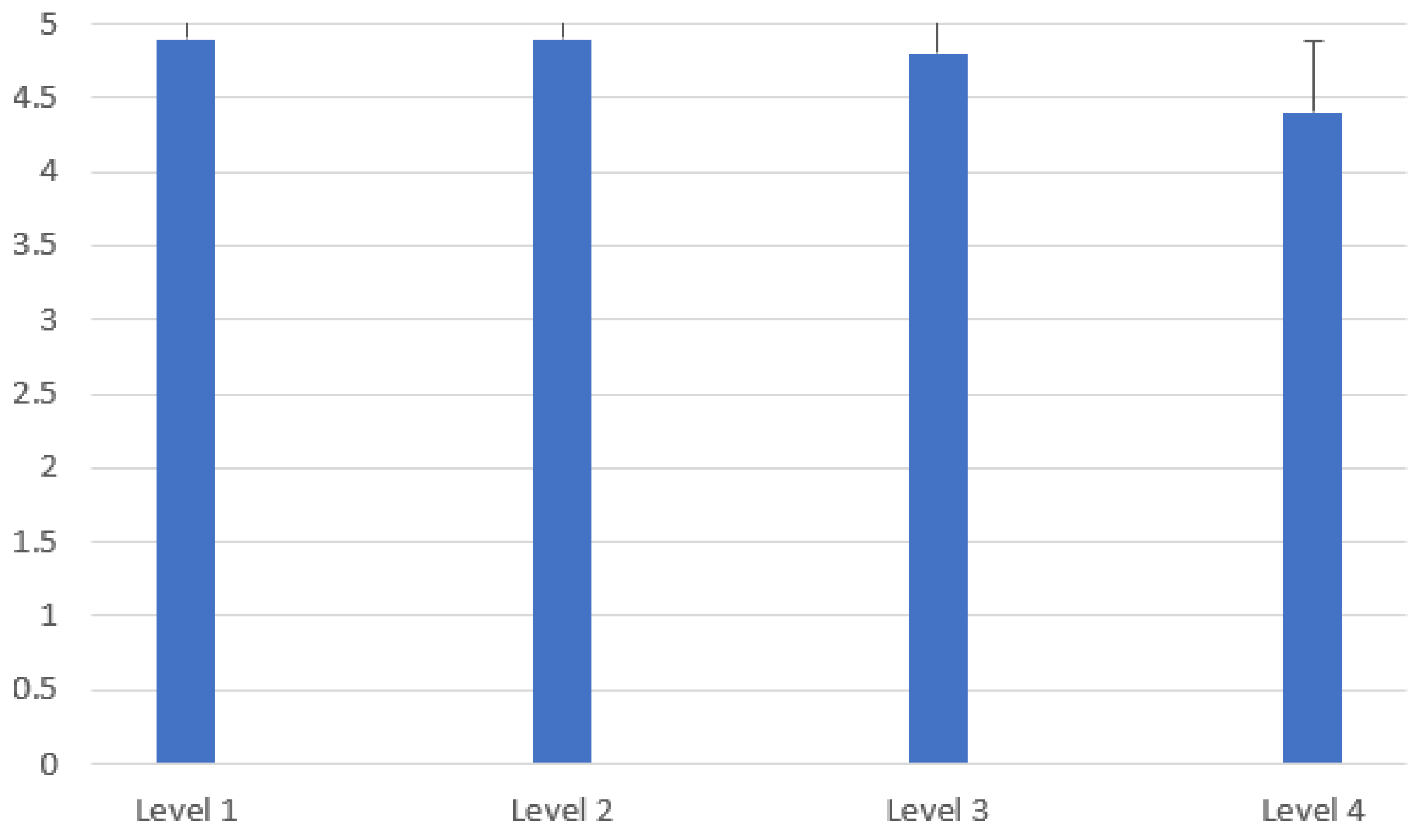
| Data | Commansense | ai2_arc | Squad | Qress | Movie | Coqa |
|---|---|---|---|---|---|---|
| Type | 1:1 QA short | 1:1 QA short | 1:1 QA short | 1:1 QA short | 1:1 QA short | N:N QA conversation |
| Format | xlsx | xlsx | xlsx | xlsx | xlsx | json |
| Size(MB) | 0.3 | 0.1 | 1.8 | 0.8 | 7.3 | 19.5 |
| Volumn | 6959 | 1307 | 36,355 | 15,125 | 136,803 | 191,607 |
| Metrics | Questions | Score |
|---|---|---|
| Conversation Functionality by Level | How appropriate is the level of questions and answers in the conversation? | Level 1–4 |
| How well does the agent answer questions at each level? | Level 1–4 | |
| Level Satisfaction | How satisfied are you with the level of dialog functionality? | 5-point Likert scale |
| Conversation Flow Appropriateness | Does the conversation with the agent stay on topic? | 5-point Likert scale |
| Learning Effectiveness | Does it help the learner improve their English speaking skills? | 5-point Likert scale |
| Question | Agent Expected Answer |
|---|---|
| Hi, what’s your name? | My name is Odinga. What’s your name? |
| My name is David. Nice to meet you! | Nice to meet you too, David! |
| How old are you, Odinga? | I’m 8 years old. How old are you? |
| I’m 9 years old. | Cool! |
| Hey! How are you doing? | I’m doing well, thank you. |
| How about you? | |
| I’m good too, thanks. What day is it today? | Today is Monday. |
| How’s the weather today? | It’s sunny. |
| Do you like sunny days? | Yes, I like sunny days. How about you? |
| Question | Agent Expected Answer |
|---|---|
| Hey, Odinga! Do you like soccer? | Yes, I love soccer! |
| That’s awesome. | |
| Do you have a favorite team? | My favorite team is Manchester United |
| What about you? | |
| My favorite team is Manchester United too. | |
| Do you have a favorite player? | My favorite player is Son Hong Min. |
| Today is Monday. Did you have a nice weekend? | Yes, I did. |
| What did you do yesterday? | I went hiking with my friends. |
| That sounds amazing! | |
| Did you take any pictures? | Yes, I took a lot of pictures with my friends. |
| Can you show me the pictures? | Sure, I can show you later. |
| Question | Agent Expected Answer |
|---|---|
| Hey, Odinga! What do you like to do in your free time? | I love to read books and watch movies. |
| How about you? | |
| I like playing video games and hanging out with friends. | |
| What kind of books and movies do you like? | I like to read all kinds of books For movies, I like comedies |
| Do you have any favorite authors or movies? | Yes, my favorite author is Jane Austen. |
| Have you ever played soccer before? | Yes, I have played soccer a few times with my friends. |
| Are you good at soccer? | I’m not very good at it. |
| Don’t worry, it takes practice to get better. | I hope so, too. |
| If you ever want to play together, I can give you some tips | That sounds like a good idea. |
| Maybe we can play a friendly game sometime. | Cool. |
| Question | Agent Expected Answer |
|---|---|
| I was actually calling to invite you to my birthday party next week. | Oh, that sounds like fun! When is it? |
| It’s next Saturday at 2 pm. I’m having it at my house. | Okay, great! I would love to come. Do you want me to bring anything? |
| No need to bring anything, just yourself! But if you want to bring a small gift, that’s totally up to you. | Sure, I’ll bring a gift for you. What kind of things do you like? |
| Hmm, I like books, movies, and board games. But really, anything you bring will be appreciated. | Okay, I’ll find something special for you. I’m really excited to celebrate your birthday with you! |
| Do you like playing soccer? | Yes, I love playing soccer. How about you? |
| I like soccer too, but I also like playing with dolls. | That’s great. Do you have a favorite doll? |
| Yes, her name is Daisy. She’s my best friend. | Aw, that’s sweet. I have a favorite toy too. It’s a toy car that I love to play with. |
| That sounds fun! Do you want to come over to my house and play with Daisy sometime? | Sure, that would be awesome! Maybe we can also play some soccer together |
| That sounds like a great idea! | Cool. |
Disclaimer/Publisher’s Note: The statements, opinions and data contained in all publications are solely those of the individual author(s) and contributor(s) and not of MDPI and/or the editor(s). MDPI and/or the editor(s) disclaim responsibility for any injury to people or property resulting from any ideas, methods, instructions or products referred to in the content. |
© 2023 by the authors. Licensee MDPI, Basel, Switzerland. This article is an open access article distributed under the terms and conditions of the Creative Commons Attribution (CC BY) license (https://creativecommons.org/licenses/by/4.0/).
Share and Cite
Lee, K.-A.; Lim, S.-B. Designing a Leveled Conversational Teachable Agent for English Language Learners. Appl. Sci. 2023, 13, 6541. https://doi.org/10.3390/app13116541
Lee K-A, Lim S-B. Designing a Leveled Conversational Teachable Agent for English Language Learners. Applied Sciences. 2023; 13(11):6541. https://doi.org/10.3390/app13116541
Chicago/Turabian StyleLee, Kyung-A, and Soon-Bum Lim. 2023. "Designing a Leveled Conversational Teachable Agent for English Language Learners" Applied Sciences 13, no. 11: 6541. https://doi.org/10.3390/app13116541
APA StyleLee, K.-A., & Lim, S.-B. (2023). Designing a Leveled Conversational Teachable Agent for English Language Learners. Applied Sciences, 13(11), 6541. https://doi.org/10.3390/app13116541






